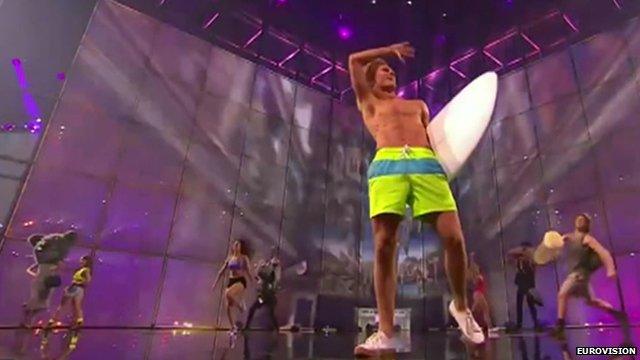Australia's affection for Eurovision pays off
- Published
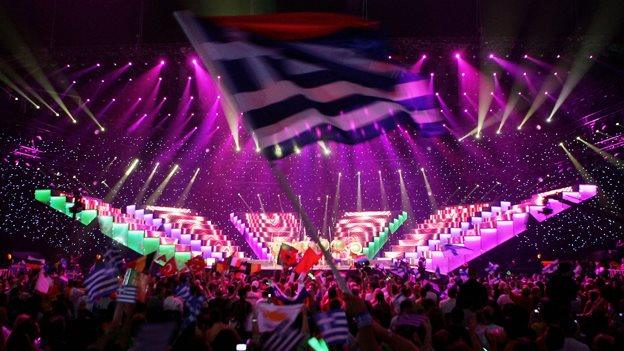
The Australian flag will join those of 39 other countries when the contest returns in May
That Australia is a "wildcard" entry to this year's Eurovision Song Contest is an understatement: the one-off invitation is the first time in the competition's 60-year history that Australians have been able to partake.
Just a few weeks before the announcement on Wednesday, Australians had celebrated a different trophy: the Asian Cup. On January 31, the Socceroos defeated South Korea 2-1 to become Asian champions.
Europe? Asia? Asia? Europe? Where does Australia belong?
Now it seems Australia is able to take the best of both continents. On May 23, Australia will be fast-tracked to the final in Vienna, Austria, to perform in front of an estimated television audience of more than 195 million in the world's most kitsch musical talent contest. Back at home, the nation will be also allowed to vote.
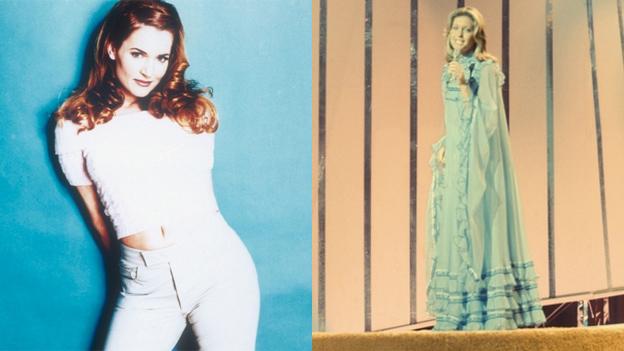
Aussies Gina G (left) and Olivia Newton John represented the UK in 1996 and 1974 respectively
Down under, the reaction on social media was one of delirium - and a fair dose of bafflement. "Speechless with excitement!" wrote Australian Ken Hunt on Facebook. "Anyone fancy a trip to Vienna?"
Others took to mockery. "Let's be honest: Australia only got allowed to enter #eurovision because most of the world confuses Austria with Australia," tweeted @kazonis, external.
Another user, @_AndrewMcGregor, deadpanned, external: "Wait. Australia is competing in Eurovision. Let me get my world map out."
Eurovision commentator Julia Zemiro told the BBC that details of Australia's act were still "secret"
That Australia lies some 15,000km from Europe at the other end of the world seems to be no barrier to Eurovision glory (Israel, Morocco, and Azerbaijan are other geographical outliers who are allowed to compete).
Australian broadcaster SBS has played the show for more than three decades and is a member of the European Broadcasting Union - the crucial criteria needed for participation.
If anything, the decision is a recognition of the special place that Eurovision holds in Australia. The country's fascination even extends to academia: The University of Melbourne's "Eurovisions" course introduces students to Europe "through the prism of its biggest annual media extravaganza".
It is also commercial gold. For SBS, who have until March 16 to decide who will represent the country, Eurovision remains one of the most important television events of the year. That Australia gets to compete is a coup: more eyeballs means more profit.
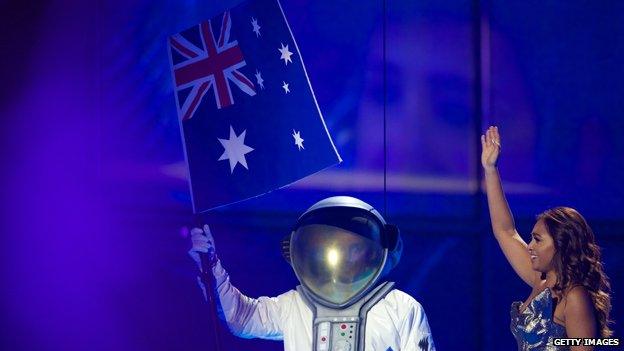
Jessica Mauboy took the stage at last year's Eurovision
Last year, the Australian indigenous singer Jessica Mauboy performed as a special guest in Copenhagen, Denmark. It gave a taste of what might come: dancers dressed as AFL-players, koalas, and surfers (presumably kangaroos were thought too cliched).
"That's one small step for Europe and one giant leap for Australia," an astronaut waving an Australian flag announced. Australia lapped it up: Over the entire weekend 2.7 million - more than 10% of the population - tuned in.
For Australians, many of whom were born in Europe or are second-generation European, the show's glitz, glamour, and glitter are as exotic as the countries represented are familiar. It is a way to reconnect with their roots whilst being entertained.
Many treat the contest as a sporting event, holding Eurovision parties, and whooping on their chosen country over stubbies. That the nation adores Abba - Eurovision's most successful and enduring winners - can hardly hurt.
And while Australians have never officially competed in Eurovision, British-born Australian Olivia Newton John competed for the UK in 1974, coming fourth, while the Irish-Australian singer Johnny Logan won Eurovision twice for Ireland in 1980 and 1987.
So who will be picked this time? Mini pop queen Kylie Minogue is an obvious front-runner - maybe in a duet with her sister Dannii. Other names floated include Tina Arena, Jessica Mauboy, Darren Hayes and Delta Goodrem.
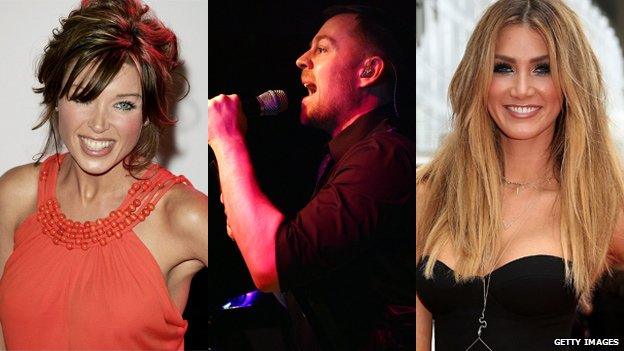
Possible contenders: Dannii Minogue, Darren Hayes and Delta Goodrem
More crucially, will they have a chance of winning?
Nations at Eurovision traditionally vote in bloc - so that the so-called "Balkan Bloc", "Eastern Bloc", and "Viking Empire" stick together. Optimists are hopeful that voters might come up trumps for Australia, the underdog with no obvious allies.
Bookies are hedging their bets - and predicting that Australia might just win. When first announced, odds in the UK numbered around 20 to 1, according to British bookmaker Matthew Woolston. Yesterday they fell to 8 to 1. Australia now ranks as a favourite alongside Estonia, Finland, Sweden and Italy.
Giving them edge is a novelty factor - and a narrative. As last year's Austrian winner, the bearded drag queen Conchita Wurst, proved, a backstory always helps.
Win or not, one thing is certain: That Australia's entry into Eurovision is a testament to a shrinking world. With technology and air travel Australia is not as far away as it once was.
So does Eurovision mark an honorary entry into Europe? Prime Minister Tony Abbott's recent decision to award Prince Philip an Australian Knight of the Order was near-fatal - seen by many as a sycophantic and embarrassing bow to Great Britain from a nation that can, and does, stand on its own two feet.
Eurovision is different - a big, brassy, bold display of national pride. And Australia's entry has proved that pop songs hold far more cultural sway than politicians ever can.
- Published11 February 2015
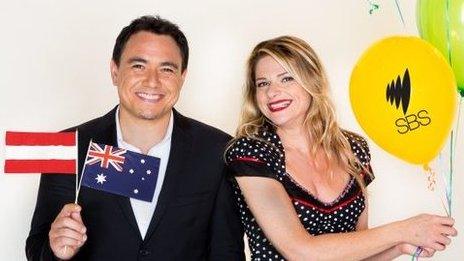
- Published11 February 2015
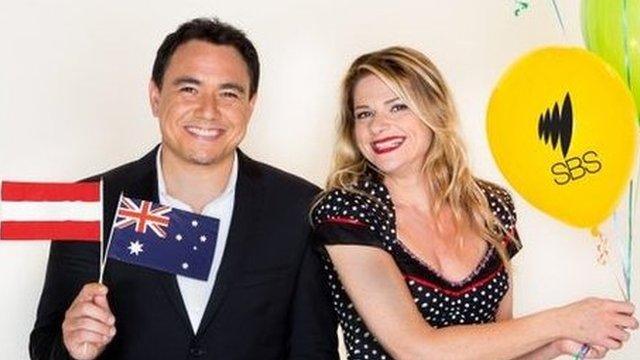
- Published11 February 2015
